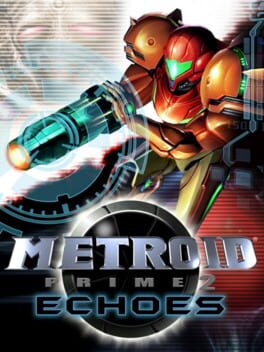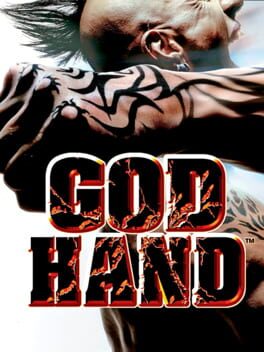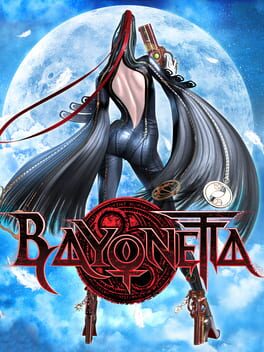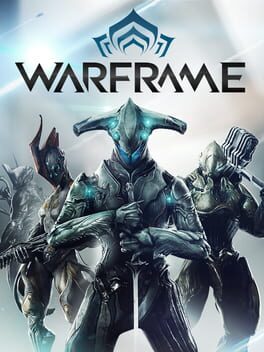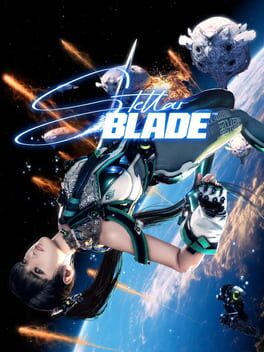Atomicflame101
191 reviews liked by Atomicflame101
HOT TAKE OF THE CENTURY - METROID PRIME 2 IS JUST AS GOOD AS THE FIRST ONE.
Now granted - this is assuming some stuff about the way you're playing. There's three pretty massive issues that can stop plenty of people from enjoying this one.
1) AWFUL save placement in Agon Wastes - I just used save states during that part, but if you don't use them this is probably so much more painful.
2) Dark World draining your health - Don't wait until your health is all the way back up!! There's health pickups everywhere!! Don't be a coward!!
3) Both starting areas are pretty gray - If you can't have me at my Temple Grounds, you don't deserve me at my Sanctuary Fortress. 😙
But aside from the above? My GOD I loved this game. There's so many little improvements from the first.
Big open rooms that make the planet feel less claustrophobic, while still keeping things tight and tense when the devs want to mix things up. Dramatically more unique area theming, meaning you get way more than just the "ice area" or "lava area" of Prime 1. World design that uses ESPECIALLY creative vertical and interconnected maps compared to the "hallway" approach of the first game. Different beams that actually require some on-the-fly strategy to mess with. World progression that's convenient to navigate AND avoids having the solution be a room you forgot about on the opposite side of the planet (most of the time). Tons more focus on kinetic movement! Making Samus feel so much more powerful at the end compared to the start!! The Dark World genuinely making you feel powerless and spooked!! Actually fun bosses!!! (most of the time).
Even the ability to use mouse and keyboard on PrimeHack was such an improvement for my overall immersion...I wish I could use this control scheme for the first game's remaster. It's SO good.
I think there's some totally fair points against Echoes, like the Dark World's areas totally blending together, dimension hopping being fairly underbaked, the love-it-or-hate-it implementation of Zelda elements, and some pretty tanky enemies here and there. I also can't ignore the fact that emulation and some minor cheats - like automatically skipping the world transition cutscenes - definitely impacted my time with it, and in a more "vanilla" play-through I probably would be much more annoyed.
But even with those in mind...I still think Echoes deserves way more love. It's easily the most underrated entry in the Metroid series, and with some minor fixes, it's JUST as fun as the first Prime entry. IMAGINE what this game could look like with an official remaster!!
I'm eating SO good as a new-ish Metroid fan wowwww.
Now granted - this is assuming some stuff about the way you're playing. There's three pretty massive issues that can stop plenty of people from enjoying this one.
1) AWFUL save placement in Agon Wastes - I just used save states during that part, but if you don't use them this is probably so much more painful.
2) Dark World draining your health - Don't wait until your health is all the way back up!! There's health pickups everywhere!! Don't be a coward!!
3) Both starting areas are pretty gray - If you can't have me at my Temple Grounds, you don't deserve me at my Sanctuary Fortress. 😙
But aside from the above? My GOD I loved this game. There's so many little improvements from the first.
Big open rooms that make the planet feel less claustrophobic, while still keeping things tight and tense when the devs want to mix things up. Dramatically more unique area theming, meaning you get way more than just the "ice area" or "lava area" of Prime 1. World design that uses ESPECIALLY creative vertical and interconnected maps compared to the "hallway" approach of the first game. Different beams that actually require some on-the-fly strategy to mess with. World progression that's convenient to navigate AND avoids having the solution be a room you forgot about on the opposite side of the planet (most of the time). Tons more focus on kinetic movement! Making Samus feel so much more powerful at the end compared to the start!! The Dark World genuinely making you feel powerless and spooked!! Actually fun bosses!!! (most of the time).
Even the ability to use mouse and keyboard on PrimeHack was such an improvement for my overall immersion...I wish I could use this control scheme for the first game's remaster. It's SO good.
I think there's some totally fair points against Echoes, like the Dark World's areas totally blending together, dimension hopping being fairly underbaked, the love-it-or-hate-it implementation of Zelda elements, and some pretty tanky enemies here and there. I also can't ignore the fact that emulation and some minor cheats - like automatically skipping the world transition cutscenes - definitely impacted my time with it, and in a more "vanilla" play-through I probably would be much more annoyed.
But even with those in mind...I still think Echoes deserves way more love. It's easily the most underrated entry in the Metroid series, and with some minor fixes, it's JUST as fun as the first Prime entry. IMAGINE what this game could look like with an official remaster!!
I'm eating SO good as a new-ish Metroid fan wowwww.
Animal Well
2024
Hi-Fi Rush
2023
God Hand
2006
"Character action" has never done it for me. I feel the floaty combos and distant cameras really dampen the impact of combat. I'm so glad that we live in the timeline where instead of representing the future of the Resident Evil series, Devil May Cry became its own franchise. Resident Evil 4 was a game that Capcom attempted to make several times, before begging Mikami to come back to the director's seat, and even he scrapped a couple of false starts before he settled on the game he ought to be making. The change in camera was the big thing that players talked about, but it was the shift in focus and tone that really made Resi 4 so beloved by its biggest fans. Mikami had gained skill, establishing multiple complementary mechanics and tying that to a campaign, but he was also more confident in his own sense of humour and whimsy. Resi 4 was a game with a real sense of personality, but it was compromised by the pressures of the surrounding franchise, the publisher and the fanbase. For his next game, he'd disregard all these aspects and make it entirely for himself.
When I first played God Hand, it took about five seconds before I knew I loved it. It's very much built on the back of Resi 4, but makes no apologies for its eccentricities. It takes the weight and impact of Resident Evil 4's shotgun and puts that behind each punch. Resi 4 utilised the sensibilities of modern games just enough to adopt a mostly useless camera manipulation system to the right analogue stick, but God Hand foregoes those conventions entirely, tethering it to your critical dodge system. God Hand doesn't care about any other game. It's fully confident in what it's doing.
God Hand's vibe is a very divisive thing, and not something you can choose to opt out of, but a truly cultured mind will undoubtedly side with it. Its sense of humour comes from a very specific place. It's a deep affection for Fist of the North Star and low-budget 70s kung fu films, but there's so much fondness for late-80s and early-90s action games, too. It loves the ridiculous, digitised voice clips from Altered Beast and Final Fight. The greatest joy is when you encounter an absurd, one-off, late-game disco miniboss, and he hits you with the same audio clips as the standard grunts from Level 1. This is a game full of explosive barrels and giant fruit. Shinji Mikami started production on Resident Evil 4 trying to fulfil the obligation to make his scariest game ever, and by the end, he got so bored with that direction that he created a giant stone robot Salazar that chased you through brick walls. God Hand was the logical next step for him.
There's a focus to God Hand's ambitions that implies Clover really knew what they had with it. A few ridiculous bosses and minigames notwithstanding, the levels are typically fairly boxy and nondescript. All the attention is on the distribution of enemies and items. It's spectacularly un-fancy. Flat ground and big brick walls that disappear when the camera gets too close to them. It doesn't care. The fighting feels great, and we're having a great time with all these stupid baddies. Fuck everything else.
Your moveset is fully customisable. Between levels, you're given the opportunity to buy new moves, and apply them to your controls, either as specials tethered to a specific button combination, or even as part of the standard combo you get while mashing the square button. It offers players real versatility as they figure out their preferred playstyles, and what works for them, while trying something less intuitive can open you up to new approaches. There are quick kicks and punches that overwhelm opponents, heavy-damage moves that take longer to pull off, guard breaks, and long-range attacks that can help with crowd control. There are certain moves and dodges that are highly exploitable, and risk breaking the game's balance. Clover are aware of this though, and whenever they found a strategy that made the game boring, they made sure to penalise you for using it by boosting the difficulty massively whenever you try it.
That's the big feature. The difficulty. God Hand starts out really hard, and when the game registers that you've dodged too many attacks or landed too many successive hits, it gets harder. This was a secret system in Resi 4, but in God Hand, it's part of your on-screen HUD, always letting you know when you've raised or lowered a difficulty level. Enemies hit harder, health pick-ups drop less frequently, and attacks become harder to land. The game's constantly drawing you to the edge of your abilities, and if you die, you have to try the entire section again from the start. It never feels too dispiriting, though. You retain all cash you've picked up after you died, and you feel encouraged by a drop in difficulty. If you do well enough on your next attempt, it won't take long before the difficulty gets back to where it was. There's also some fun surprises for those who get good enough to maintain a Level 3 or Level Die streak for long enough, with some special enemy spawns and stuff. You feel rewarded for getting good, but never patronised or pandered to. Your reward is a game that felt as thrilling as it did when you first tried it.
It's the little eccentricities in God Hand's design that I really admire. Pick up a barrel and Gene will instantly shift his direction to the nearest enemy, eliminating any extraneous aiming bullshit, and pushing your attention towards the opportunity for some cheap long-distance damage. If an item spawns, it remains there until you pick it up, giving you the opportunity to save it for when you really need it, even if the backtracking route becomes a little ridiculous. Since the camera is so stubbornly committed to viewing Gene's back, they've implemented a radar system to keep track of surrounding enemies, and it makes little sense in the context of the scenario, but the game doesn't care about that stuff. It's another thing that makes the fights against gorillas and rock stars more fun, so run with it. Between each section of the game, you're given the opportunity to save, or warp to a kind of mid-game hub world, with a shop, training area and casino, which you can use to unlock better moves and upgrades when you need them most. You can gain money by taking the honest route and chipping away at its toughest challenges, or take the less honourable route with slot machines and gambling on poison chihuahua races. It's blunt, utilitarian, and it's entirely complementary to the way God Hand feels to play.
It's the consistency in tone and intention that completes the package. God Hand knows what it is, and how it feels, and it never betrays that. It doesn't obsess over lore or characters, but it really has fun in introducing new baddies and scenarios to put you in. And I really like its taste. I like that all the big bosses meet up at a secret hell table to exchange barbs between levels. I like the fight on an enormous Venetian gondola. I like the dumb, weird, repetitive soundtrack. The developers are world-class talents, and they just wanted to make a dumb, stupid, fun game.
I probably ought to give the soundtrack a little more credit. This is from Masafumi Takada, out on loan from Grasshopper Manufacture before he became a real gun for hire, working on Vanquish, Kid Icarus: Uprising, Danganronpa and Smash Bros Ultimate. He's great at elaborate, high-energy compositions, but his work on God Hand is some of his dumbest stuff. It's great. The constant Miami 5-0 surf rock, the warbling Elvis boss fight music, and the Flight of the Bumblebee guitar for the fight against a giant fly. He's having the time of his life on this one, fully liberated from the pressures to convey a consistent tone or atmosphere. It's stunning work, and he makes the correct call every time he has to write a new piece of BGM for God Hand.
Shinij Mikami is a bit of an enigma, and his work on Resident Evil has unfortunately typecast him as a horror director, but he's never expressed a real affinity for the genre. He was put into that position under an obligation to Ghouls 'n Ghosts' Tokuro Fujiwara, and the game he ended up making was full of corny heroes and giant snakes. The subject matter was a shock to audiences in the mid-nineties, but in reality, it wasn't that far removed from his work on SNES Aladdin. By my estimation, God Hand's the closest we've come to seeing the real Mikami through his work. He's made Resident Evil 4, and he wants to leave that behind him, but EA and ZeniMax kept dragging him back to his biggest hit.
God Hand feels like the only point in history God Hand could have happened, and it's pretty wild that it did in the first place. I mean, it makes sense that once you hand Capcom the Resi 4 Gold Master disc, they'll let you do whatever you want, but they were so rattled by the result that they fired all of their key talent and started making calls to Canada to produce Dead Rising 2. Confidence in Japanese development was at an all-time low after 2006, and the PS3 and Xbox 360 resulted in some of the most embarrassing entries in many legacy franchises. The PlayStation was born out of a SNES project, and that ethos was what drove the first decade of Sony Computer Entertainment. Afterwards, a new game proposal would not be greenlit without referencing the design of the latest Grand Theft Auto. The Konami, Namco, Square and Capcom that we have today don't reflect who they were in the nineties and early 2000s. To me, God Hand feels like the final page of that chapter. But, man, what a fucking statement to close out on.
When I first played God Hand, it took about five seconds before I knew I loved it. It's very much built on the back of Resi 4, but makes no apologies for its eccentricities. It takes the weight and impact of Resident Evil 4's shotgun and puts that behind each punch. Resi 4 utilised the sensibilities of modern games just enough to adopt a mostly useless camera manipulation system to the right analogue stick, but God Hand foregoes those conventions entirely, tethering it to your critical dodge system. God Hand doesn't care about any other game. It's fully confident in what it's doing.
God Hand's vibe is a very divisive thing, and not something you can choose to opt out of, but a truly cultured mind will undoubtedly side with it. Its sense of humour comes from a very specific place. It's a deep affection for Fist of the North Star and low-budget 70s kung fu films, but there's so much fondness for late-80s and early-90s action games, too. It loves the ridiculous, digitised voice clips from Altered Beast and Final Fight. The greatest joy is when you encounter an absurd, one-off, late-game disco miniboss, and he hits you with the same audio clips as the standard grunts from Level 1. This is a game full of explosive barrels and giant fruit. Shinji Mikami started production on Resident Evil 4 trying to fulfil the obligation to make his scariest game ever, and by the end, he got so bored with that direction that he created a giant stone robot Salazar that chased you through brick walls. God Hand was the logical next step for him.
There's a focus to God Hand's ambitions that implies Clover really knew what they had with it. A few ridiculous bosses and minigames notwithstanding, the levels are typically fairly boxy and nondescript. All the attention is on the distribution of enemies and items. It's spectacularly un-fancy. Flat ground and big brick walls that disappear when the camera gets too close to them. It doesn't care. The fighting feels great, and we're having a great time with all these stupid baddies. Fuck everything else.
Your moveset is fully customisable. Between levels, you're given the opportunity to buy new moves, and apply them to your controls, either as specials tethered to a specific button combination, or even as part of the standard combo you get while mashing the square button. It offers players real versatility as they figure out their preferred playstyles, and what works for them, while trying something less intuitive can open you up to new approaches. There are quick kicks and punches that overwhelm opponents, heavy-damage moves that take longer to pull off, guard breaks, and long-range attacks that can help with crowd control. There are certain moves and dodges that are highly exploitable, and risk breaking the game's balance. Clover are aware of this though, and whenever they found a strategy that made the game boring, they made sure to penalise you for using it by boosting the difficulty massively whenever you try it.
That's the big feature. The difficulty. God Hand starts out really hard, and when the game registers that you've dodged too many attacks or landed too many successive hits, it gets harder. This was a secret system in Resi 4, but in God Hand, it's part of your on-screen HUD, always letting you know when you've raised or lowered a difficulty level. Enemies hit harder, health pick-ups drop less frequently, and attacks become harder to land. The game's constantly drawing you to the edge of your abilities, and if you die, you have to try the entire section again from the start. It never feels too dispiriting, though. You retain all cash you've picked up after you died, and you feel encouraged by a drop in difficulty. If you do well enough on your next attempt, it won't take long before the difficulty gets back to where it was. There's also some fun surprises for those who get good enough to maintain a Level 3 or Level Die streak for long enough, with some special enemy spawns and stuff. You feel rewarded for getting good, but never patronised or pandered to. Your reward is a game that felt as thrilling as it did when you first tried it.
It's the little eccentricities in God Hand's design that I really admire. Pick up a barrel and Gene will instantly shift his direction to the nearest enemy, eliminating any extraneous aiming bullshit, and pushing your attention towards the opportunity for some cheap long-distance damage. If an item spawns, it remains there until you pick it up, giving you the opportunity to save it for when you really need it, even if the backtracking route becomes a little ridiculous. Since the camera is so stubbornly committed to viewing Gene's back, they've implemented a radar system to keep track of surrounding enemies, and it makes little sense in the context of the scenario, but the game doesn't care about that stuff. It's another thing that makes the fights against gorillas and rock stars more fun, so run with it. Between each section of the game, you're given the opportunity to save, or warp to a kind of mid-game hub world, with a shop, training area and casino, which you can use to unlock better moves and upgrades when you need them most. You can gain money by taking the honest route and chipping away at its toughest challenges, or take the less honourable route with slot machines and gambling on poison chihuahua races. It's blunt, utilitarian, and it's entirely complementary to the way God Hand feels to play.
It's the consistency in tone and intention that completes the package. God Hand knows what it is, and how it feels, and it never betrays that. It doesn't obsess over lore or characters, but it really has fun in introducing new baddies and scenarios to put you in. And I really like its taste. I like that all the big bosses meet up at a secret hell table to exchange barbs between levels. I like the fight on an enormous Venetian gondola. I like the dumb, weird, repetitive soundtrack. The developers are world-class talents, and they just wanted to make a dumb, stupid, fun game.
I probably ought to give the soundtrack a little more credit. This is from Masafumi Takada, out on loan from Grasshopper Manufacture before he became a real gun for hire, working on Vanquish, Kid Icarus: Uprising, Danganronpa and Smash Bros Ultimate. He's great at elaborate, high-energy compositions, but his work on God Hand is some of his dumbest stuff. It's great. The constant Miami 5-0 surf rock, the warbling Elvis boss fight music, and the Flight of the Bumblebee guitar for the fight against a giant fly. He's having the time of his life on this one, fully liberated from the pressures to convey a consistent tone or atmosphere. It's stunning work, and he makes the correct call every time he has to write a new piece of BGM for God Hand.
Shinij Mikami is a bit of an enigma, and his work on Resident Evil has unfortunately typecast him as a horror director, but he's never expressed a real affinity for the genre. He was put into that position under an obligation to Ghouls 'n Ghosts' Tokuro Fujiwara, and the game he ended up making was full of corny heroes and giant snakes. The subject matter was a shock to audiences in the mid-nineties, but in reality, it wasn't that far removed from his work on SNES Aladdin. By my estimation, God Hand's the closest we've come to seeing the real Mikami through his work. He's made Resident Evil 4, and he wants to leave that behind him, but EA and ZeniMax kept dragging him back to his biggest hit.
God Hand feels like the only point in history God Hand could have happened, and it's pretty wild that it did in the first place. I mean, it makes sense that once you hand Capcom the Resi 4 Gold Master disc, they'll let you do whatever you want, but they were so rattled by the result that they fired all of their key talent and started making calls to Canada to produce Dead Rising 2. Confidence in Japanese development was at an all-time low after 2006, and the PS3 and Xbox 360 resulted in some of the most embarrassing entries in many legacy franchises. The PlayStation was born out of a SNES project, and that ethos was what drove the first decade of Sony Computer Entertainment. Afterwards, a new game proposal would not be greenlit without referencing the design of the latest Grand Theft Auto. The Konami, Namco, Square and Capcom that we have today don't reflect who they were in the nineties and early 2000s. To me, God Hand feels like the final page of that chapter. But, man, what a fucking statement to close out on.
Bayonetta
2009
Bayonetta has been my number one favorite game pretty much since I first played it back in 2010, but when I had that initial realization I’d honestly barely even scratched its surface. To this day I’m still finding new ways to play and improve my strats, which speaks to just how hard it nails that sweetspot between mechanics that are intrinsically satisfying, malleable, but also highly intentional; somehow it’s the one action game that does everything. The control system is so smooth and flexible it’s influenced every genre title since; knocking dudes into each other or tearing through the battlefield with Beast Within offers a sense of physicality other comparable games still don’t come close to; the enemies are some of the most aggressive, varied and polished you’ll ever encounter in a melee combat game; and all of that is wrapped up in a scoring system that miraculously manages to give you clear rules to work with while still allowing for a huge degree of expression. Even the ridiculous Angel Weapons make sense from that perspective — they give you a generous buffer to use whatever playstyle appeals to you in and still earn a Platinum combo in the end.
Between Witch Time, the equipment system and Dodge Offset, Bayonetta makes it easy to name-drop its most obvious gimmicks and leave it there, but those last two in particular are an insane step up for the genre when it comes to freedom and intentionality. How to trip an enemy up, where to launch them, whether to use magic or not: no other action game makes you consider these questions so actively at this fast of a pace, and I can’t get enough of it.
Between Witch Time, the equipment system and Dodge Offset, Bayonetta makes it easy to name-drop its most obvious gimmicks and leave it there, but those last two in particular are an insane step up for the genre when it comes to freedom and intentionality. How to trip an enemy up, where to launch them, whether to use magic or not: no other action game makes you consider these questions so actively at this fast of a pace, and I can’t get enough of it.
